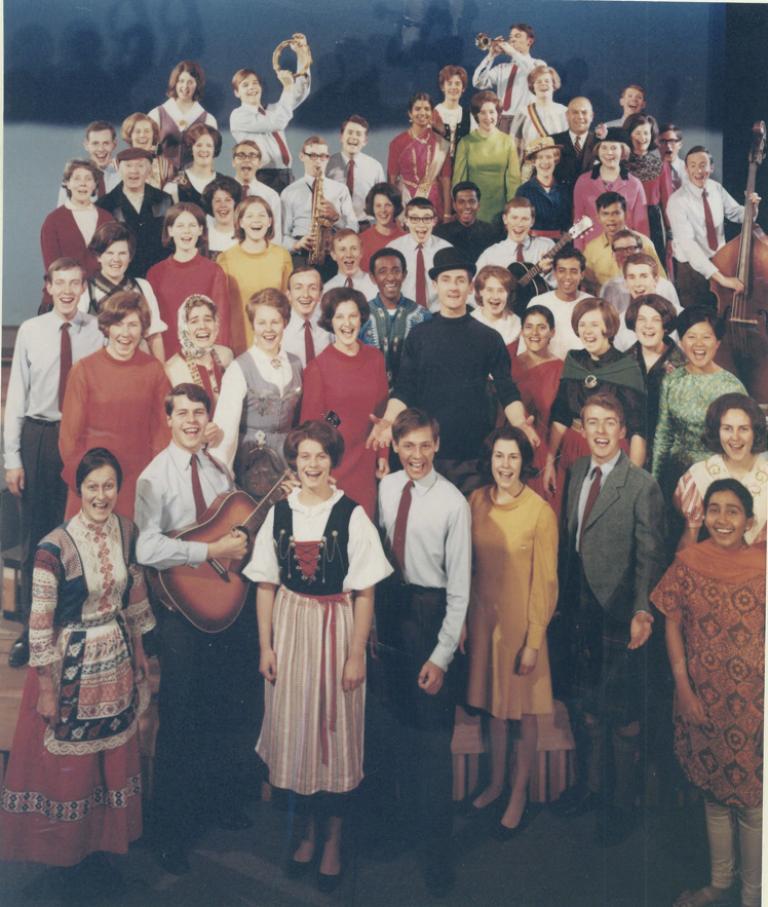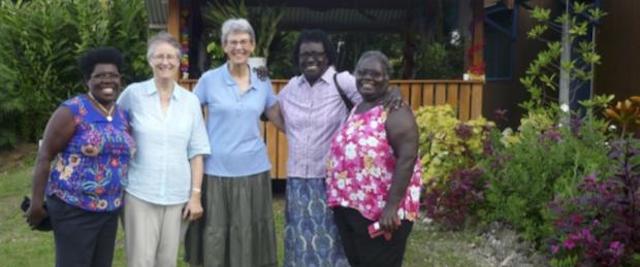Growing up in 'the country'
I grew up in Blackburn, Victoria. It was in the country district then. I’d been involved in MRA and activities at Armagh through my parents. Following nursing training and starting work in Melbourne, I was faced with a choice about whether or not to go to an MRA conference in Canberra.
The guest speaker at the conference was Rajmohan Gandhi [a grandson of Mahatma Gandhi]. This was in January 1966, a peak holiday period when other staff were on leave. The only way I could get to the conference was to resign my job. After two months of inner struggle, I knew it was right to be at this conference.
Rajmohan Gandhi invited young Australians and New Zealanders to come to India to perform in a musical, which we’d yet to write. It became ‘Sing Out, Australia.’ Gandhi’s invitation to us was to ‘give what you know, and learn what you don’t know.’ His aim was to build a clean, strong, united India.
Musicals and more

Money was raised for travel, costumes and equipment. Many people gave generously. We even managed to get a plane that was to fly back empty from Perth to Mumbai, carrying us and all the equipment for a stage show. Most of us in the cast and crew were in our late teens and 20s.
There was a sense at the time of an axis of emerging nations that included India, Australia, and Japan, and of the need for relations between these countries to be strengthened. In Europe, the Prague Spring of 1968 was probably a turning point, politically. We felt that ordinary people had a role in determining the course of nations. The musical revues were a great way to offer fresh thinking and meet people.
From India, several of us were invited on to Europe. We joined the cast of ‘It’s Our Country, Jack’, which was a response to the seven-week port strike in the UK, and later ‘Anything to Declare’, which toured Europe and the British Isles. The sketches performed in this show were all drawn from real-life stories.
During the northern summers, the cast of ‘Anything to Declare’ supported the conferences at Caux, the IofC Centre in Switzerland. There I learnt to be part of a cook team, being responsible for cooking for groups numbering up to 600 people. It was in the summer of 1969 that Alan and I were married. He was the stage manager of ‘Anything to Declare.’ Our first married years were ‘on the road’ with a certainty that this was God’s plan for us at this time.
In 1969, ‘Anything to Declare’ was invited to India, Malaysia, Australia, New Zealand, Papua New Guinea, Hong Kong, Singapore, Iran and Malta. That was a two-year tour; it was huge. About 50 of us travelled together. In Australia, there were shows in Perth, Adelaide and Melbourne. Arriving in Papua New Guinea, many songs were translated into Tok Pisin [Pidgin] the most common language. These had to be learnt very quickly!
Papua New Guinea and Australia

Alan and I both felt independently we would return to PNG. In 1971, in the lead-up to PNG’s independence, we were involved in the translation process into Tok Pisin of an MRA film called ‘Freedom,’ which had been written by Africans. It was so relevant, because it drew from experiences of colonial history as well as recounting individuals’ own experiences of personal change and relevant community experiences. The film was screened in many areas of PNG. We returned to PNG on a third visit in 1975, and PNG’s independence from Australia was gained later that year.
It was during these times that Alan got to know many Members of Parliament and the civil service, laying the foundation for his ongoing commitment to PNG, including an AusAID-supported trust-building project between PNG and Bougainville, and his Track 3 diplomacy efforts during the civil war between PNG and Bougainville, from 1988 to 1998. He must have made more than 30 visits over the years. It meant I did a lot of solo parenting, to free him to be able to go from Melbourne. I have no regrets: the experience has helped me to understand the life of single mums. Our overall commitment to IofC in the Pacific also has involved supporting those involved in the Solomon Islands, Fiji and Samoa.
Living in the Pacific and learning how to respond culturally were both a challenge and a gift. A PNG woman who knew Alan well commented that Alan “thought like a Papua New Guinean,” with an ability to let go of his view of life and embrace theirs. That’s something I’ve begun to understand. You have to look at other people’s own worldview and learn to work from within that.
In Australia, I’ve been part of the National Coordination Group and involved in programs such as Life Matters, Discover the Other and Creators of Peace. We lived at Armagh at different times, for about 10 years in total. My role now with the Armagh Portfolio is to support the smooth running of Armagh as a venue, residential IofC Centre and home, aiming for good teamwork with all involved. Armagh is still very much a place for reconciliation and growth, creative new programs, and acknowledgement that global change starts with personal change. My work with Creators of Peace has grown and has also embraced the Solomon Islands and, lately, Bougainville. There’s a sort of continuum there with Alan’s work.
Learning from life
I was in my mid-40s when I realized, following an honest conversation with myself, that since childhood I’d shut down my feelings and not allowed myself to make mistakes. By this time, I had become my father’s carer during his ill health, and things were a bit tense. This understanding and ensuing exploration within was vital to building a better relationship with Dad and finding healing. This came at three stages, the last being the inspirational thought that I could start each day as a fresh page, having let go the burden of yesterday and yesteryear.
Alan’s passing has been one of the deepest sadnesses and challenges for me. He was the love of my life, my soul mate. He was the doer in PNG, but we constantly talked ideas through, always searching for inspiration together in our shared Quiet Time. Since then, I’ve had to ‘rebadge’ myself as a single person. People do treat you differently…I’ve had to learn to be content in my own skin. A daily Quiet Time has been the place to find peace of heart and search for how I am meant to use my life.
I still have a commitment to volunteering at the Caux conferences over the Northern summer. In recent years it has been in the diet kitchen. Caring for people and cooking good meals enables good conversation, often life changing and sometimes nation changing. I feel my role has been to create that atmosphere to have the conversations that are needed.
As part of the Cultural and Structural Change (CSC) process that IofC Australia went through a few years ago, we were each asked what we’d like to do in our approaching retirement. My dream has been to visit friends in their own homes – previously I had only worked with them at IofC centres. So, recently, when I’ve gone to Caux, I have thought seriously about which friends I should visit during that trip. It has been immensely rewarding - renewing friendships and being privileged to be part of some very special conversations. That’s been such a gift – as is knowing that there’s still a divine plan for me in life.

